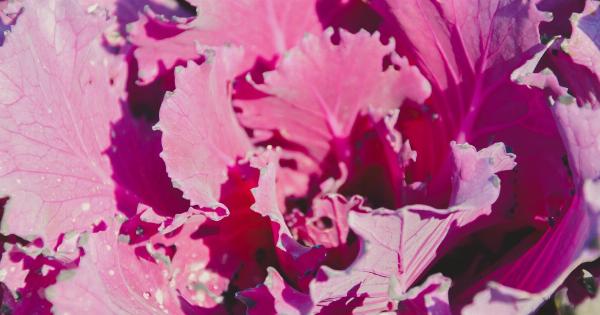In the pursuit of longevity and good health, people have turned to a range of approaches – from regular exercise to superfoods.
In recent decades, scientists have been investigating the role of micronutrients, such as vitamins, in promoting longevity and warding off diseases. One vitamin that has emerged as a potential anti-aging nutrient is vitamin K2. Also known as menaquinone, this vitamin is an unsung hero in the world of vitamins, and yet, it plays a crucial role in the health of the bones, heart, and even the brain.
What is Vitamin K2?
Vitamin K2 is a fat-soluble vitamin that is found in animal and fermented foods.
Unlike vitamin K1, which is best known for its role in blood clotting, vitamin K2 is involved in the activation of certain proteins that promote healthy bones, cardiovascular health, and even brain function. There are different forms of vitamin K2, including MK-4 and MK-7, with MK-7 being more biologically active and longer-lasting in the body.
Top 10 Sources of Vitamin K2
If you want to increase your intake of vitamin K2, here are the top 10 sources you should consider adding to your diet:.
1. Natto
Natto is a traditional Japanese dish made from fermented soybeans that is rich in vitamin K2, particularly MK-7.
This slimy and smelly dish may not be everyone’s favorite, but it is considered a superfood in Japan, and many studies have shown that it has numerous health benefits, including improved bone health and reduced risk of cardiovascular disease.
2. Fermented Cheese
Fermented cheese, particularly aged cheese like Gouda, cheddar, and blue cheese, is a good source of vitamin K2. A 1-ounce serving of Gouda cheese, for instance, can provide up to 73 micrograms of vitamin K2.
However, it is worth noting that not all cheeses are fermented and not all fermented cheeses contain significant amounts of vitamin K2.
3. Egg yolks
Egg yolks, especially those from free-range hens that have access to green grass and insects, are a good source of both vitamin K2 and vitamin D. A single large egg yolk contains around 32 micrograms of vitamin K2, mostly in the form of MK-4.
4. Grass-fed Butter and Ghee
Butter made from the milk of grass-fed cows is an excellent source of vitamin K2, particularly MK-4. Ghee, which is clarified butter, is also a good source of vitamin K2, as it contains small amounts of this nutrient per tablespoon.
5. Chicken Liver
Chicken liver is a nutrient-dense food that is rich in many vitamins and minerals, including vitamin K2. A 3-ounce serving of cooked chicken liver contains around 10 micrograms of vitamin K2, mostly in the form of MK-4.
However, it is important to choose organic and pasture-raised chicken to avoid exposure to harmful toxins like antibiotics and pesticides.
6. Grass-fed Beef
Grass-fed beef is not only a great source of protein, but it is also an excellent source of vitamin K2, particularly MK-4. A 3.5-ounce serving of grass-fed beef contains around 5 micrograms of vitamin K2.
Moreover, grass-fed beef has a higher ratio of omega-3 to omega-6 fatty acids, which has been linked to reduced inflammation and improved heart health.
7. Sauerkraut
Sauerkraut is a type of fermented cabbage that is a good source of vitamin K2, particularly MK-6. A 1-cup serving of raw sauerkraut contains around 30 micrograms of vitamin K2.
Moreover, sauerkraut is also rich in probiotics, which can improve gut health and boost immunity.
8. Chicken Breast
Chicken breast, especially that from pasture-raised chickens, is a good source of vitamin K2, particularly MK-4. A 3-ounce serving of cooked chicken breast contains around 2 micrograms of vitamin K2.
However, the skin and dark meat of chicken contain higher amounts of vitamin K2 than the breast meat.
9. Mackerel
Mackerel is a fatty fish that is not only rich in omega-3 fatty acids but also in vitamin K2, particularly MK-4. A 3.5-ounce serving of cooked mackerel contains around 10-15 micrograms of vitamin K2.
Eating fatty fish like mackerel has been associated with improved cardiovascular health and reduced risk of cognitive decline.
10. Prunes
Prunes, also known as dried plums, are a good source of vitamin K2, particularly MK-6. A 1/4-cup serving of prunes contains around 15 micrograms of vitamin K2.
Moreover, prunes are also rich in antioxidants and fiber, which can improve digestion and protect against chronic diseases.
The Benefits of Vitamin K2
While vitamin K2 has not received as much attention as other vitamins like vitamin D and C, many studies have demonstrated its crucial role in promoting longevity and good health. Here are some of the benefits of vitamin K2:.
Promotes Bone Health
One of the primary roles of vitamin K2 is to activate osteocalcin, a protein that helps to bind calcium to the bones and improve bone density.
Several studies have shown that higher intake of vitamin K2 is associated with improved bone health and lower risk of fractures in both men and women. In fact, in a study published in the Journal of Bone and Mineral Research, women who consumed the highest amount of vitamin K2 had a 20% lower risk of hip fractures than women who consumed the least amount.
Improves Cardiovascular Health
Vitamin K2 is also involved in the activation of matrix Gla protein (MGP), a protein that helps to prevent calcium from accumulating in the arteries and causing plaque buildup.
Studies have shown that higher intake of vitamin K2 is associated with a lower risk of cardiovascular disease and arterial calcification. In a study published in the American Journal of Clinical Nutrition, men who consumed the highest amount of vitamin K2 had a 50% lower risk of coronary heart disease than men who consumed the least amount.
Protects Against Cancer
Emerging evidence suggests that vitamin K2 may also have anti-cancer properties. For instance, a study published in the European Journal of Epidemiology found that higher intake of vitamin K2 was associated with a lower risk of prostate cancer.
Similarly, a study published in the Journal of Nutrition found that higher intake of vitamin K2 was associated with a lower risk of advanced-stage lung cancer in men.
Improves Cognitive Function
Vitamin K2 may also play a role in brain health, particularly in protecting against neurodegenerative diseases like Parkinson’s and Alzheimer’s.
A study published in the Journal of Alzheimer’s Disease found that higher intake of vitamin K2 was associated with better cognitive function and reduced risk of Alzheimer’s disease in older adults.
Conclusion
Vitamin K2 may not be a household name like vitamin C or D, but it is a crucial nutrient that promotes longevity and good health.
Adding more vitamin K2-rich foods like natto, fermented cheese, egg yolks, and grass-fed butter to your diet can help you reap its numerous benefits, from improved bone and cardiovascular health to reduced risk of diseases like cancer and dementia. So, the next time you prepare your meal, remember to include some of these vitamin K2 powerhouses and take a step towards a healthier and longer life.































